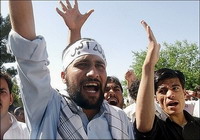Marine tribunal puts off investigation of Afghan civilians' killing
U.S. Marine Corps legal tribunal delayed the investigation of the killing of 19 Afghan civilians earlier this year.

The court of inquiry, which will examine the roles of two Marines present during the shootings, was pushed back tentatively to the first week of December, said Maj. Sean Gibson, a spokesman for the Marines at Central Command.
The court was originally scheduled to start Thursday and run about two weeks.
"It was just a matter of getting all the different schedules together," Gibson said.
As many as 19 people were killed and 50 injured in March when Marines opened fire on a crowded roadway after their convoy was rammed by a vehicle loaded with explosives, according to U.S. Army officials. The shootings occurred in Afghanistan's Nangahar province.
Lt. Gen. James Mattis, the top Marine officer at Central Command, ordered the court to examine the roles of Maj. Fred Galvin, who was a company commander with the 2nd Marine Special Operations Battalion, and Capt. Vincent Noble, the platoon commander.
Afghanistan's Independent Human Rights Commission has said witnesses reported the Marines fired indiscriminately at civilian cars and pedestrians. The commission also said it did not find evidence that the unit had come under fire.
No Marines have been charged in the shooting.
Eight members of the company were ordered back to Camp Lejeune after the incident. The remainder of the unit was ordered to leave Afghanistan and return to ships in the Persian Gulf.
Gibson said he could not provide details on why Galvin and Nobel were singled out, adding that it was unlikely other Marines would be formally examined.
Galvin's civilian lawyer, Mark Waple, has said his client never told anyone to fire and did not fire shots himself.
Mattis will review findings of the court of inquiry to determine if criminal charges are warranted. The court will be comprised of senior officers who will hear testimony before making a recommendation to Mattis. Names of those officers have not been released.
The tribunal is a rare legal mechanism that allows a commander to review a report before deciding whether to recommend charges and start the military legal process.
The Marines have not used such a tribunal since 1956 when a drill sergeant was investigated for marching a group of recruits into a South Carolina creek where six died.
Subscribe to Pravda.Ru Telegram channel, Facebook, RSS!


